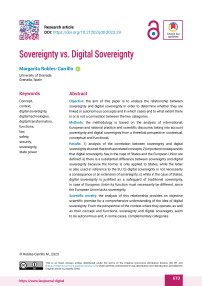Sovereignty vs. Digital Sovereignty
Автор: Robles-Carrillo M.
Журнал: Journal of Digital Technologies and Law @lawjournal-digital
Рубрика: Государство и право. Юридические науки
Статья в выпуске: 1 (3), 2023 года.
Бесплатный доступ
Objective: the aim of this paper is to analyze the relationship between sovereignty and digital sovereignty in order to determine whether they are linked or autonomous concepts and in which cases and to what extent there is or is not a connection between the two categories. Methods: the methodology is based on the analysis of international, European and national practice and scientific discourse, taking into account sovereignty and digital sovereignty from a threefold perspective: contextual, conceptual and functional. Results: 1) analysis of the correlation between sovereignty and digital sovereignty showed that both are related concepts; 2) important consequences that digital sovereignty has in the case of States and the European Union are defined: a) there is a substantial difference between sovereignty and digital sovereignty because the former is only applied to States, while the latter is also used in reference to the EU; b) digital sovereignty is not necessarily a consequence or an extension of sovereignty; c) while in the case of States, digital sovereignty is justified as a safeguard of traditional sovereignty, in case of European Union its function must necessarily be different, since the European Union lacks sovereignty. Scientific novelty: the analysis of this relationship provides an objective scientific premise for a comprehensive understanding of the idea of digital sovereignty. From the perspective of the context where they operate, as well as their concept and functions, sovereignty and digital sovereignty seem to be autonomous and, in some cases, complementary categories. Practical significance: the dual functionality of digital sovereignty as a concept attached to national sovereignty and as an autonomous concept helps to explain the use of this category in the case of states and in the case of an organization such as the European Union, as well as the differences in its scope and meaning in each scenario.
Concept, context, digital sovereignty, digital technologies, digital transformation, functions, law, safety, security, sovereignty, state power
Короткий адрес: https://sciup.org/14127543
IDR: 14127543 | DOI: 10.21202/jdtl.2023.29


